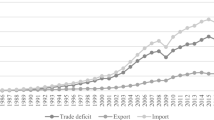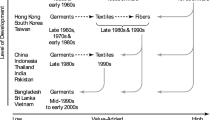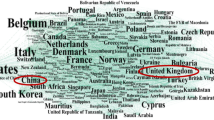Abstract
We formulate a two-stage game to examine the parallel import (PI) policies for large developing countries. Two countries, a developed (N) and a developing (S), make their PI policies in the first stage. A high-quality variety is produced in N by a monopoly firm, and a low-quality variety is produced in S by a lot of firms under perfect competition. The monopoly firm chooses the optimal pricing strategy in the second stage. We clarify how market outcomes and PI policies depend on the quality difference, the income differential, country sizes, and the weights of consumer surplus and firm profits in measuring the national welfare. Our results provide a theoretical base for developing countries to make their PI policies according to their market sizes. Discriminatory pricing is obtained when governments care about consumer surplus, while uniform pricing is obtained when governments care about firm profit.




Similar content being viewed by others
Notes
As a result, the issue of aftermarket services is an important topic in this field. See Ishikawa et al. (2016).
References
Bennato AR, Valletti T (2014) Pharmaceutical innovation and parallel trade. Int J Ind Organ 33:83–92. https://doi.org/10.1016/j.ijindorg.2014.02.009
Brekke KR, Holmas TH, Straume OR (2015) Price regulation and parallel imports of pharmaceuticals. J Public Econ 129:92–105. https://doi.org/10.1016/j.jpubeco.2015.08.002
Chen Y, Maskus KE (2005) Vertical pricing and parallel imports. J Int Trade Econ Dev 14:1–18. https://doi.org/10.1080/0963819042000333225
Chen Y, Schwartz M (2015) Differential pricing when costs differ: a welfare analysis. RAND J Econ 46:442–460
Ganslandt M, Maskus KE (2007) Vertical distribution, parallel trade, and price divergence in integrated markets. Eur Econ Rev 51:943–970. https://doi.org/10.1111/1756-2171.12091
Ishikawa J, Morita H, Mukunoki H (2016) Trade liberalization and aftermarket services for imports. Econ Theory 62:719–764. https://doi.org/10.1007/s00199-015-0925-4
Li C, Maskus K (2006) The impact of parallel imports on investment in cost-reducing research and development. J Int Econ 68:443–455. https://doi.org/10.1016/j.jinteco.2005.07.006
Malueg DA, Schwartz M (1994) Parallel imports, demand dispersion, and international price discrimination. J Int Econ 37:167–195. https://doi.org/10.1016/0022-1996(94)90044-2
Maskus KE (2000) Parallel imports. World Econ 23:1269–1284. https://doi.org/10.1111/1467-9701.00329
Maskus KE, Chen Y (2002) Parallel imports in a model of vertical distribution: theory, evidence, and policy. Pac Econ Rev 7:319–334. https://doi.org/10.1111/1468-0106.00167
Maskus KE, Chen Y (2004) Vertical price control and parallel imports: theory and evidence. Rev Int Econ 12:551–570. https://doi.org/10.1111/j.1467-9396.2004.00467.x
Mills E, Cooper C, Seely D, Kanfer I (2005) African herbal medicines in the treatment of HIV: Hypoxis and Sutherlandia—an overview of evidence and pharmacology. Nutr J 4:19. https://doi.org/10.1186/1475-2891-4-19
Mussa M, Rosen S (1978) Monopoly and product quality. J Econ Theory 18(2):301–317. https://doi.org/10.1016/0022-0531(78)90085-6
Richardson M (2002) An elementary proposition concerning parallel imports. J Int Econ 56:233–245. https://doi.org/10.1016/S0022-1996(01)00110-6
Roy S, Saggi K (2012) Equilibrium parallel import policies and international market structure. J Int Econ 87:262–276. https://doi.org/10.1016/j.jinteco.2012.01.007
Scherer F, Watal J (2002) Post-TRIPS options for access to patented medicines in developing nations. J Int Econ Law 5:913–939. https://doi.org/10.1093/jiel/5.4.913
Szymanski S, Valletti T (2005) Parallel trade, price discrimination, investment, and price caps. Econ Policy 44:706–749
Valletti TM, Szymanski S (2006) Parallel trade, international exhaustion and intellectual property rights: a welfare analysis. J Ind Econ 54:499–526
Acknowledgements
The authors owe a lot to two anonymous referees for very insightful and constructive suggestions. We are also grateful to Ryo Itoh, Naoto Jinji, Yasushi Kawabata, Tatsuhito Kono, Kieth E. Maskus, Mehmet S. Tosun, and Yang Zhang for helpful comments. This research was partially funded by JSPS KAKENHI Grant Number JP17H02514 of Japan and National Natural Science Foundation Grant Number 71733001 of China.
Author information
Authors and Affiliations
Corresponding author
Additional information
Publisher's Note
Springer Nature remains neutral with regard to jurisdictional claims in published maps and institutional affiliations.




